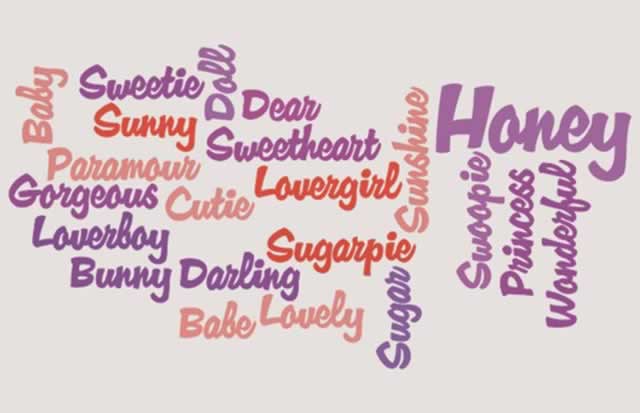Terms of endearment


In a relationship the terms of endearment above are most appropriate and acceptable, but are not appropriate within a professional context
Blessing Musariri Shelling the Nuts
What I find inappropriate and most annoying is when you are in your professional capacity and somebody crosses over and uses what is typically known as a term of endearment.
When we are born, each of us is given a name. There is a history to that name. You will see on forms, a space on which to write your First name, and then your Surname. In many cases, first names are referred to as Christian names. There is a history to this also. I won’t delve into that. Our names are our identity. If we are in a crowd and somebody wants to find us, they will call out our name and we will step forward to say here I am, that is me you are calling, that is my name.
Now as we get older, particularly in general African culture, our names fade into the roles we play and we become better known as tete, amainini, amaiguru, ambuya, sekuru, mukoma etc, especially where younger people are now concerned. It is required by the laws of common respect, that you do not address your elders by their first names because this invites a blurring of the lines in terms of hierarchy and the familiarity would naturally bring about “contempt”.
To keep the boundaries between the young and foolish and the older and wiser there is the fence, known as a title.
Coming from Zimbabwe into the English university culture I really struggled with this.
I arrived in a place where a lecturer would stand up and say, “Good morning all, it’s a pleasure to be here to start of this new semester with you. I am your Commercial Law lecturer and my name is John Pickering, you can call me John.” This was news to me and contrary to what one may think, it was not good news, especially when everyone happily took John at his word and addressed him as John and I found I could not utter the name to his face.
I didn’t want to sound strange and unadaptable by being the only one to put up my hand and say, “Excuse me Mr Pickering . . .” and so I spent the first year avoiding having to address any of my lecturers by name. I skirted the issue by using generic phrases and incoherent noises in the place of people’s names, who were not my peers. I knew I was in a different place now and the rules were different, but my conditioning was too strong. Eventually I learned to do it and understood that I was not showing disrespect in doing so. Of course I do not do it here.
Some things do not change and in fact as I grow older, I find they are reinforced. I find it strange and somewhat annoying when the little white friends of my nieces and nephews call my sisters by their first names. It sounds wrong and over-familiar and myself I am surprised to find that I prefer to have that title of auntie before my name, when it is young children addressing me, particularly those who I would have come across in a more familiar setting.
I don’t care so much if it is children of people I don’t know and with whom I have a professional connection, such as if I am at a school giving a reading and I have introduced myself as Blessing. It’s a fine line, but it’s there.
Of course, in the workplace, it is even more relaxed than it was at university, but I found I struggled here as well, especially in the Zimbabwean workplace where I found that the familiarity of calling directors and senior managers etc, by their first names just did not feel comfortable and so for the most part I stuck to Mr and Mrs So and So unless I had a friendly relationship with the people in question. In this way it was easy to guess who were workmates and who were simply associates. In this kind of setting I was happy to be called by my first name because of course, we were all adults and it didn’t matter one’s position, we were in it together.
What I find inappropriate and most annoying is when you are in your professional capacity and somebody crosses over and uses what is typically known as a term of endearment. “Hello dear, your order is ready.” “My dear, I would need to hear back from you with your position on the matter by Friday.” “Hi dear, it was a good meeting this afternoon, how was the rest of your day?”
These are people who have no business calling you dear or otherwise because you are not close enough for there to be any emotional connection, being people you have met once or twice in a business capacity and it immediately takes the interaction from business into murky waters. The “dear” coming maybe from another woman, and I find these days that it’s young and older woman alike who are free with this term, has the effect of making it seem like they are in some position of authority over you, it is patronising, let’s just call a spade a spade.
Coming from someone of the opposite sex, it is not only patronising, but it leads into the “come on” territory, where you begin to ask yourself, is this person coming on to me? Are they being serious about what they are doing?
How am I “dear” to him all of a sudden? Is it because I am a woman and all women are potential mates (play or otherwise) to him and therefore need not be taken seriously in any other context? Why do people in business feel that this is an appropriate form of address? To me this is crossing a line and being too familiar.
Yes, in certain countries you may be called dearie and luv and honey by strangers because it is their way and part of the norm in their society, but I doubt that even there, when one is in a professional capacity they should be throwing these terms around.
It could also simply be that it comes down to the function of language within a particular culture. English language is functional within the Zimbabwean context, it is not our cultural language, it is the language of operation and therefore, when we try to appropriate its culture, the results are discordant and somewhat unnatural and annoying.
As my father always used to say, “We are Africans, at the end of the day, let us not get ahead of ourselves.” We must contain our enthusiasm for things of perceived sophistication and suaveness until we fully understand the context from which they are derived and even then, we must weigh the purpose they actually serve in our own lives. I understand that to some people it’s no big deal and others who use these terms see it as a way of being affable and warm towards people they have just met and wish to encourage to feel comfortable with them but it is not appropriate.
There are people who can get away with this, and this tends to be people with naturally big and effusive personalities, but with the rest, for the most part it is contrived and condescending.
Perhaps this is a harsh judgment and I am being overly sensitive but as I enter what I call, the “no apology” years I find myself less able to be quiet and go with the flow when someone I am dealing with in a business capacity starts to call me “dear”.
I used to grin and bear it, but now I find I cannot. I will tell you that I do not like to be called “dear” within my professional context as I do not feel it is appropriate and could you please desist. I think it would be helpful all round if people just understood that in general it is best to use appropriate language for the particular setting in which they find themselves.
It makes life simpler and more comfortable for everyone. It is highly unlikely that someone will come up to you and say, “Hello, my name is Peter, but you can call me, My Dear.”









Comments